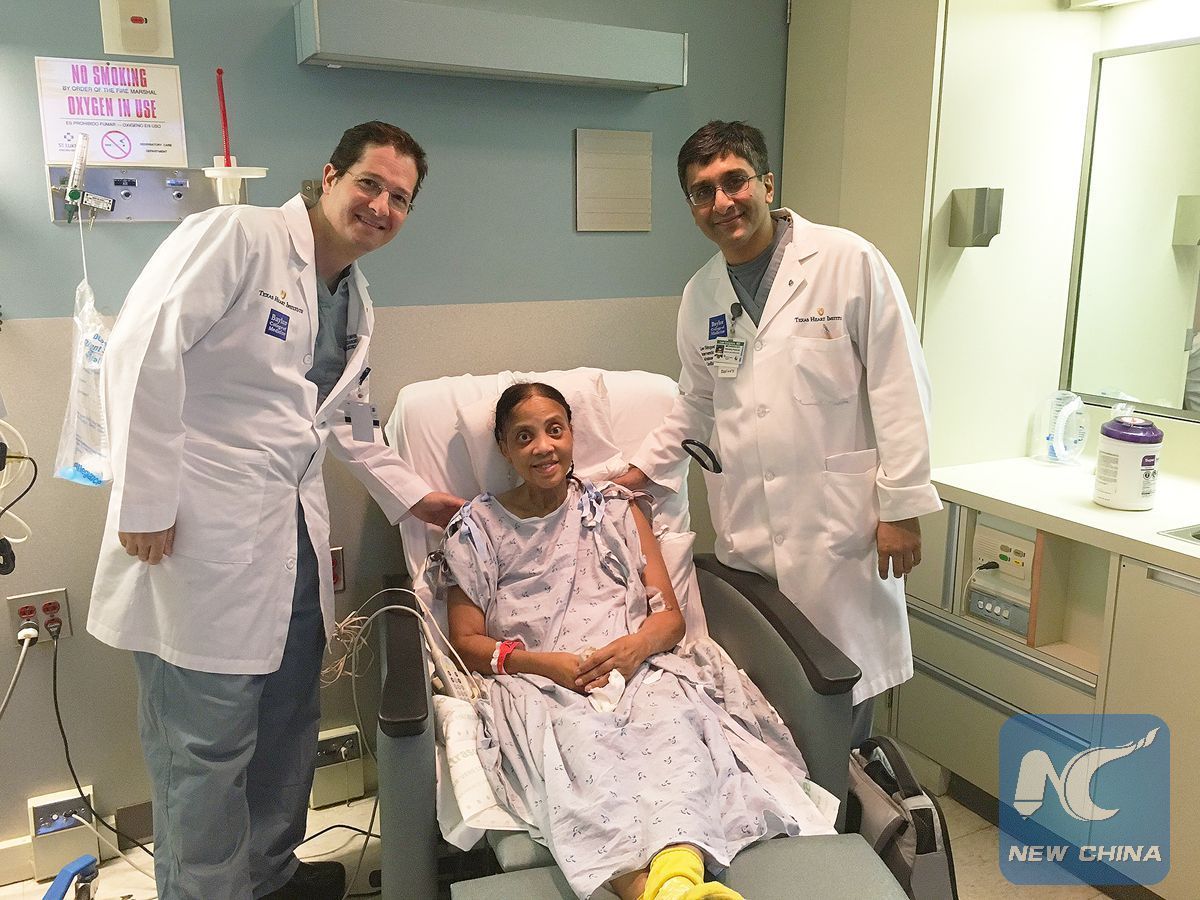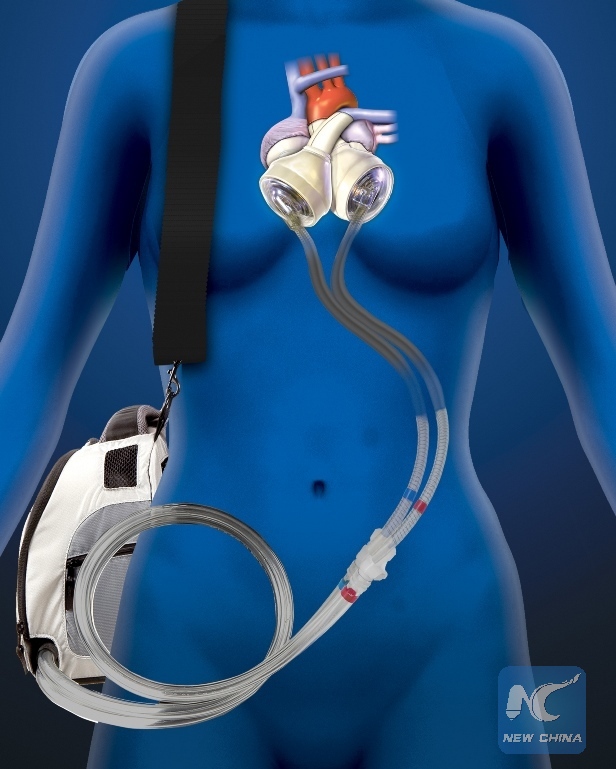 Dr. Jeffery Morgan, left, successfully implanted the new 50 cc SynCardia Total Artificial Heart in Cynthia McGuffie, who was suffering from end-stage biventricular heart failure and under the care of Dr. Leo Simpson, right, at Baylor St. Luke's Medical Center, a Hospital in the Texas Medical Center in Houston, Texas, the United States. (Xinhua Photo/Zen Zheng)
Dr. Jeffery Morgan, left, successfully implanted the new 50 cc SynCardia Total Artificial Heart in Cynthia McGuffie, who was suffering from end-stage biventricular heart failure and under the care of Dr. Leo Simpson, right, at Baylor St. Luke's Medical Center, a Hospital in the Texas Medical Center in Houston, Texas, the United States. (Xinhua Photo/Zen Zheng)
By Zen Zheng
HOUSTON, Feb. 12 (Xinhua) -- Woo-digada! Woo-digada! Woo-digada! Woo-digada! The constant, rapid noise from Cynthia McGuffie's backpack can be jarring to one who first hears it. But to her it sounds like some Caribbean-rhythm drummed briskly on a conga.
"It's my heartbeat; It's my life. I can't live without it now," 55-year-old McGuffie, who has the backpack with her day and night, told Xinhua in a recent exclusive interview.
The backpack holds a battery-driven device connected to her chest via tubings, which powers a total artificial heart recently implanted in her at Baylor St. Luke's Medical Center, a hospital in the Texas Medical Center, the world's largest medical center in Houston in the southern state of Texas. The computerized device, known as the driver, also monitors her blood flow.
"I can do so many things that I couldn't before. I can move around; I can walk, and even jog," said the petite, bright-eyed McGuffie who received the 50cc SynCardia Total Artificial Heart, the latest, smaller man-made heart developed by the American company SynCardia Systems.
With her heart beginning to fail three years ago, McGuffie lost her ability to work and had to rely on a pacemaker. As her heart rapidly deteriorated, in spring 2016, she was admitted to Baylor St. Luke's, home to the Texas Heart Institute, a prestigious cardiology and heart surgery facility founded by the late, world-renowned heart surgeon Dr. Denton Cooley, best known for his successful first human heart transplant in the U.S. in 1968 and the world's first total artificial heart implantation in 1969. There, McGuffie was diagnosed with end-stage biventricular heart failure and put on a donor heart transplant waiting list.
Months had passed and no suitable organ was available for McGuffie due to her small frame and high antibody count in her blood. Given only days to weeks to live, she was told her only hope was implantation of the 50cc SynCardia, a brand-new artificial heart designed for those with small stature, which is approved only for clinical trial by the U.S. Food and Drug Administration.
McGuffie jumped at her only chance of survival.
"I was surprised that I had this option. My family wanted me to live, and I wanted to live, too," she said.
It took heart surgeon Dr. Jeffery Morgan more than five hours to complete the procedure on McGuffie. Within days, she was sitting up in bed, and in less than two months became the first in Texas and third in the U.S. discharged from a hospital with an implanted 50cc SynCardia, a smaller version of its processor, the 70cc SynCardia.
"She would have died had she not received the artificial heart," said Morgan, surgical director of Mechanical Circulatory Support and Cardiac Transplant of the Texas Heart Institute and chief of Cardiothoracic Transplant and Circulatory Support at Baylor College of Medicine.
"She has much more energy, is no longer short of breath, and candoactivities of daily living," Morgan told Xinhua recently. "She has no signs of heart failure, nor any device-related complications such as bleeding, infection or stroke."
Her husband Ed McGuffie was surprised at her fast recovery. For the family, the round-the-clock white noise from the backpack is music to the ear, a happy reminder of her presence.
"We're so grateful she's still with us; she's got her life back with this surgery," he said to Xinhua.
The artificial heart serves as a transition to an eventual donor heart - given an appropriate organ becomes available - or a device for long-term use by one who isn't a candidate for transplant. McGuffie remains hopeful of getting a transplant one day.
Morgan said that her prognosis is good.
"Patients like her live for years on the SynCardia device," he said, describing the device as "a monumental leap forward" in artificial heart technology.
 Illustration of the 50cc SynCardia Total Artificial Heart implanted in the patient and connected to the driver carried on the patient's shoulder. (Xinhua Photo/Zen Zheng)
Illustration of the 50cc SynCardia Total Artificial Heart implanted in the patient and connected to the driver carried on the patient's shoulder. (Xinhua Photo/Zen Zheng)
"It has the potential to revolutionize this field," he said. "Due to its smaller size, we can now treat smaller patients who previously couldn't be treated with artificial heart technology, and get them back to living a close-to-normal lifestyle."
Cardiovascular disease is the leading cause of death worldwide, killing about 17 million people each year, according to the World Health Organization (WHO). The U.S. Centers for Disease Control and Prevention (CDCP) estimates that about 600,000 people die from heart disease in the U.S. each year. In 2015, as many as 100,000 patients in the country needed new hearts and about 2,500 received one.
"There's a huge need for donor organs, but the demand is far greater than supply," Morgan said. "That's why artificial heart has increasingly been recognized for its significance in keeping patients alive and restoring normalcy to their lives."
SynCardia's total artificial heart replaces both dying heart ventricles and the four heart valves to restore blood circulation, pumping up to 9,500 cubic centimeters per minute through both ventricles - a daily total of about 7.6 million cubic centimeters of blood servicing more than 96,500 kilometers of vessels in an average-sized person. It enables the patient's vital organs to recover from damages, preparing the patient for a potential transplant.
"This device is instrumental in saving the patient's life both by eliminating the symptoms and source of end-stage heart failure and acting as bridge to transplant in someone dying from heart failure," said Dr. Leo Simpson, McGuffie's primary cardiologist who is assistant professor at Baylor College of Medicine and director of Interventional Heart Failure at Baylor St. Luke's.
Dr. James Willerson, president of the Texas Heart Institute, called the successful implantation of the 50cc SynCardia "an important step in the evolution of artificial heart devices" and an example of the continuation of a five-decade legacy of innovative cardiovascular care started with Cooley, who died at 96 in November last year.
Over the years, surgical luminaries at the institute followed Cooley's example to blaze their own trails, including Dr. O.H. "Bud" Frazier, one of the surgeons who implanted early SynCardia devices in four patients over a 12-day period in 2011.
Morgan said that he and his colleagues have been developing a new generation of artificial heart.
The SynCardia Total Artificial Heart is a pulsatile device. Its driver powers the heart with pulses of air, pneumatically driving two separate pumps in the artificial ventricles to generate pulsatile blood flow. With parts constantly moving, the device will eventually wear out.
"We've been trying to create a continuous-flow total artificial heart, which I believe will be the first in the world," Morgan said, noting the device's greater durability can be achieved if pulsatile motion is done away with.
"We're in the animal experiment development phase. I'm hopeful that in two to three years our device can be used in humans."

